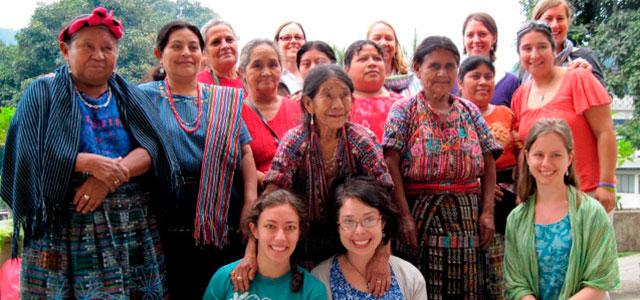
Jenna Shaw-Battista (bottom center, wearing glasses) with colleagues and local midwives in Guatemala
Crowdfunding to Support Midwifery Education in Guatemala
The UCSF School of Nursing’s Jenna Shaw-Battista is among the first faculty to take advantage of a new UCSF partnership with Indiegogo, an online “crowdfunding” platform that allows individuals and organizations to reach donors across the globe.
The partnership was initially conceived as an experiment in novel research funding, but Shaw-Battista – an associate clinical professor in the Department of Family Health Care Nursing and director of the UCSF/San Francisco General Hospital Interdepartmental Nurse-Midwifery Education Program – didn’t see why it couldn’t also benefit other types of projects. In December 2012, she launched an Indiegogo campaign that attracted 165 donors and raised $13,890 for the Midwives for Comadronas project, a collaborative education and service program that sends midwives and midwives-in-training to Guatemala to exchange knowledge and help provide key resources to local families and midwives, as well as a hospital and a birth center.
American and Guatemalan Midwives Learn from One Another
Midwives for Comadronas is an extension of an earlier service-learning project that allowed faculty and students from UCSF, the University of San Francisco and the University of Washington to visit Guatemala and help local comadronas (traditional Guatemalan midwives) conduct maternal and child health assessments and distribute medical supplies. Additional funding from the Indiegogo campaign will now allow Shaw-Battista and her colleagues in Guatemala to expand the project’s educational reach and potentially expand health care capacity in an area with few resources or trained providers.
In February 2013, Shaw-Battista will make a trip to Guatemala to work with the local health care community on planning a continuing education component for comadronas and identifying local students interested in further training through the project. She’ll also arrange for her UCSF students to stay with comadronas and their families to create a “total immersion” experience, which will allow her to direct to the host midwives funds that would otherwise be spent on hotels for the students. This is a key part of the planned project revision and will greatly benefit the comadronas, who provide much of their care free to the community.
“Our students and the comadronas and comadrona students really want to learn from one another,” says Shaw-Battista, “and we each have things to teach.” The comadronas, for example, are anxious to learn new lifesaving skills – neonatal resuscitation techniques or how to use medication safely to prevent and treat postpartum hemorrhage – while the UCSF students can benefit from local midwives’ expertise in areas not commonly covered in US nurse-midwifery curricula.
“Our students are anxious to learn how you can deliver babies safely in places with no light source or running water, or how to use local herbs when you don’t have access to medication,” says Shaw-Battista. This is especially valuable training for nursing students interested in global health, or who will work in immigrant communities in the US. “Every experience working in low-resource conditions can make them better, more compassionate and resourceful practitioners in the future regardless of their practice site.”
Using Indigogo to Attract and Engage Donors
Through Indiegogo, Shaw-Battista was able to create a web page that informed people about the campaign and allowed her to easily collect donations large and small via the project page. She and her students created videos that provided perspectives on maternal-child health in Guatemala and spread the word via their contacts and social media. The Indiegogo platform provides a way to recognize donors through “perks”; donors to Midwives for Comadronas will receive gifts that include personal stories and photos about students’ experiences and families helped, as well as local crafts from Guatemala.
“The response has been amazing,” says Shaw-Battista. “We’ve gotten everything from $5 donations through the Indiegogo site to a large donation that will completely cover the cost of the planning trip.” Additional funds will also allow her to purchase desperately needed supplies. Previously, faculty and students paid their own way to Guatemala and relied on donations of medication and equipment to take with them, but now, thanks to the additional funding, they can purchase items according to greatest need and benefit.
“A few dollars goes a long way there,” Shaw-Battista says. “A dollar can buy antihemorrhagic medication. Twenty dollars can send a woman to a clinic for lifesaving treatment.”
The Indiegogo platform is intended for short projects with a specific fundraising goal, but the crowdfunding experiment demonstrates how health care workers, educators and others with vision can use technology and social media to invite the public at large to participate in their work. The campaign has engaged a larger audience in some unanticipated ways. In addition to raising funds through Indiegogo, for example, the campaign generated interest among supporters who are donating to the project through the UCSF Foundation; others have contributed material goods such as gloves and training manuals for the comadronas, and a local artist plans to gift a painting for future use in a silent auction. Shaw-Battista is hoping to continue building on the interest generated by the Indiegogo campaign to further expand the project in years to come. She’s created a Facebook page to engage potential participants and donors, and posted the project video to YouTube to spread the word about maternal health issues in Guatemala and the Midwives for Comadronas project.
Although the Indiegogo campaign has ended, donations can still be made to the Midwives for Comadronas project via the School of Nursing’s support page. Click “Choose a designation,” then click the “Other” box and type “Midwives for Comadronas” in the space provided.



